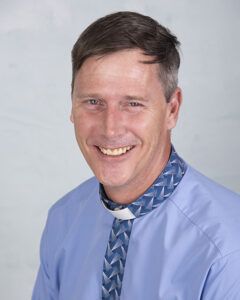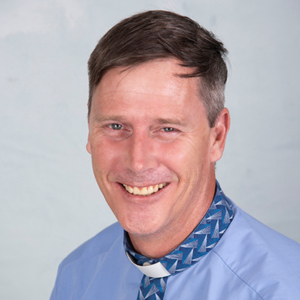Vernon Foster will be joining the Diocese of Islands and Inlets as the incumbent at St Paul, Nanaimo, from May 1, 2024. Here he tells us a bit about his upbringing, his education and career, the challenges he sees facing the Anglican Communion, and the most inspiring sermons he’s heard.

I was born and grew up in suburban Pretoria, South Africa. I have lived in Pretoria all my life, with the exception of about 18 months in Johannesburg after my parents got divorced, a year while doing national service in the South African Navy and two years at the College of the Transfiguration in Grahamstown.
I was baptized at 25 days old in 1972 in the parish of St Michael and All Angels, Sunnyside. My confirmation was at Corpus Christi, Garsfontein, on March 16, 1988.
I went to Pretoria Boys High School. After school, I wanted to study theology straight away, but my parents encouraged me to do something else before going into the church and theological studies. They felt that I needed something to fall back on.
So, I attended the Pretoria Technikon (now Tshwane University of Technology), where I started studying plant production (basically learning to farm). I confess to being desperately lazy in my studies and soon left that. That’s when I went to do national service in the South African Navy. While I was doing that, I decided to try my hand at doing theological studies by correspondence, and that didn’t go well either. I think my parents were right about one thing: grow up a little before you pursue a career in ministry.
When I turned thirty, I bleached my hair to a lovely carrot colour, and made the decision to go to university and get my bachelor of arts degree in theology. This I did at the University of Pretoria. After getting my degree, I spent two years at the College of the Transfiguration, where I got a diploma in ministry. While I was at the seminary in Grahamstown, I started an honours bachelor of theology degree, which I completed in my first year as a deacon.
Currently, I am serving as the assistant chaplain at St Mary’s Diocesan School for Girls in Pretoria. I started in this role at the beginning of 2020, and it has been a journey of learning and adapting to a new ministry in a different context. Most of my work at the school revolves around elementary and early middle school students.
Prior to my position at St Mary’s DSG, I held two rector positions. From 2018 until the end of 2019, I served as the rector of Corpus Christi in Garsfontein. It was an unusual experience as I grew up in that parish, and my parents are still active members. When I mentioned to the bishop that Jesus said a prophet is not without honour in their own hometown, he responded, “Don’t worry, my son, no one is going to confuse you with a prophet.”
Prior to my position as rector, I had served my curacy at Corpus Christi from 2007 to 2008, assisting in establishing a new parish in Pretoria East. I just laid a foundation there, but I am pleased that St Anne has grown into a vibrant and active parish.
My first rectorship was a nine-year commitment at Trinity Church in Lynnwood. This church plant involved collaboration between Anglicans and Presbyterians, who shared facilities and occasional joint worship services on special feast days. During this time, I playfully referred to myself as an “Angliterian” or perhaps a “Pranglican.”
I was elected a canon of the cathedral in 2014 and then again after the new bishop took office in 2018. The responsibility of a canon is to serve as an advisor to the bishop and the diocesan leadership structures. Being elected canon by my peers was a highlight of my time as a priest. It was good to know they believed I had the necessary learning to help lead and guide the conversations on gender and human sexuality in the Diocese of Pretoria.
While sexuality and the differing theological positions on this matter appears to be the greatest challenge to the Anglican church today, I think the challenges are way more complex than that. Don’t get me wrong, I am wholly committed to an inclusive church, regardless of one’s background, past or current circumstances, or even whom one loves and builds a home with. I think these are simply pegs on which to hang the more complex matter of who makes theological pronouncements on deeply divisive matters, who is in charge, and who fulfils and controls our instruments of unity in the Anglican Communion. There are deep colonial hangovers within the Anglican Communion, and it is these that we will need to come to terms with while we work on finding consensus on other theological matters. In short and to use Justin Welby’s analogy, we need to figure out how to live together in the same house while occupying different bedrooms.
I wouldn’t say I’ve heard any unusual sermons but there are two that have stood out for me. The rector of my parish in my teen years at Corpus Christi gave a sermon on Epiphany, which appealed to my rather scant knowledge of stellar navigation. Father Bob spoke about what the magi might have seen in the night sky that prompted them to seek the Christ child. For me it was about hearing God in unconventional ways.
The other thing that stood out in a sermon was something Bishop Allan Kannemeyer said when he became the Bishop of Pretoria. He told us, “For you I am a bishop, with you I am a priest.”
I love sailing and hope to get to do that when we settle down in Nanaimo. I have found every position in my career deeply fulfilling, having grown from each. I am grateful to God for all the learning, both in good times and challenging times. However, I have always held a special place in my heart for the Mission to Seafarers and would like to have been able to do that work.
I am also a self-taught flautist, and I am particularly fond of Irish music. I believe there is an Irish music group in Nanaimo with which I hope to connect and improve my playing.



